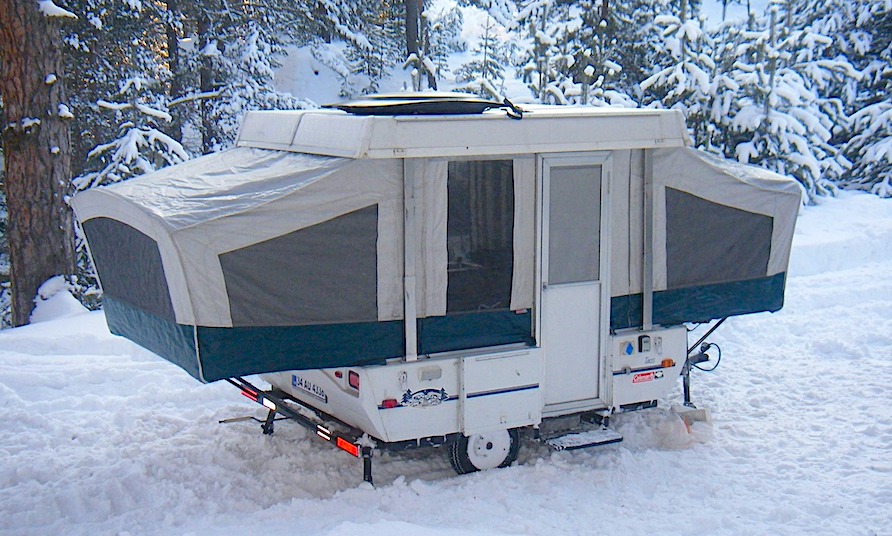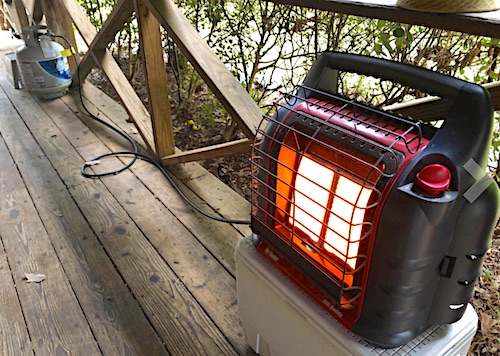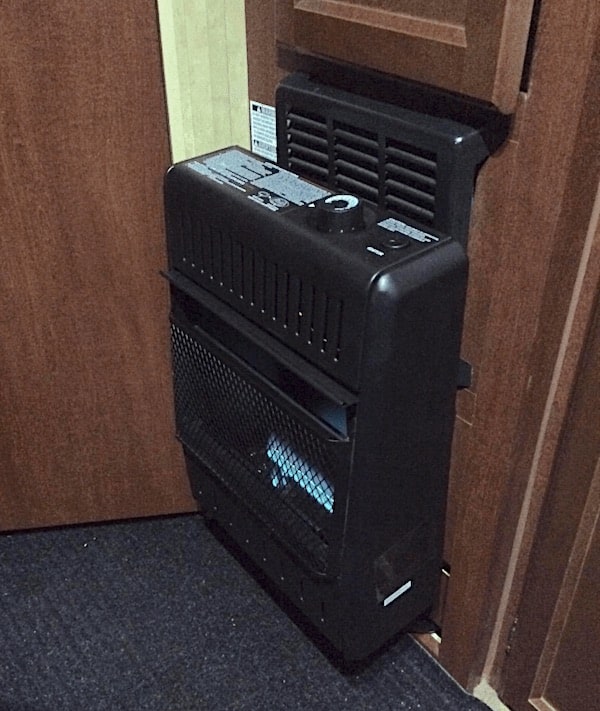Thanks for your support! If you make a purchase using our links in this article, we may make a commission. And, as an Amazon Associate, I earn from qualifying purchases. See the full disclosure here.
Making the decision to purchase an RV or trailer is a big one. It is a big financial commitment and it requires a lot of work to maintain everything. However, deciding to purchase an RV or trailer is only the start of your journey. You also need to decide what type of camper you are going to purchase. One type that you might overlook is a pop up camper. A pop up camper is a great option for anyone that wants to take their family out on the road for a fun family vacation.
But, can you use a pop up camper in the winter? The short answer is yes. But clearly you will need to learn some tips and tricks to keep your popup camper warm while camping in cold weather.
Pop up campers are also known as folding tent campers and tent trailers. They are campers that collapse into a much smaller and portable package. They are a lot like a popup tent but on a larger scale. You might be skeptical about purchasing a popup camper because it goes against the norm. However, they are just as effective as the other options available to you. A popup camper will have sleeping spaces for you and your family, a kitchen, and a bathroom. So, you will have all the essentials to live your best life while you are out on the road.
The best part about purchasing a pop up camper is that it is much easier to lug around than a regular RV or trailer. They fold up into a nice, small package that makes towing much easier. You can maneuver your car easier when you have a smaller package to tow, so you can also get to areas you would not be able to otherwise. So, do not be scared, go ahead, and try a pop up camper and you will have a blast on your next family trip.
Can You Stay Warm in a Pop Up Camper?
One big concern for people when they make the decision to purchase a popup camper is the heating situation. You can use a popup camper during the winter, but you will need to take measures to ensure that you stay warm. This means that you will need to put in more work to use it during the winter than you would with another RV or trailer.
The most important thing to do if you are traveling in the winter with a popup camper is to pack a bunch of warm clothes. Although there are things you can do to heat up your pop up camper, it will never get as warm as an RV with regular heating. So, make sure you pack lots of winter clothes and pack clothes that you can wear in layers while you sleep.
Although this will not help with heating you up, it is important to know the contact information for emergency crews near where you plan on parking. You never know when you are going to have an emergency, especially in the winter. If it snows overnight, you could easily end up in a situation where your popup camper is stuck in the snow.
If this happens and you do not have everything you need to stay warm, it could be a death sentence. However, if you have the contact information for emergency services, they will come to find you and help you. It is better to be safe than sorry, so make sure you have that information before you leave on any trip.
How Well Do Pop Up Campers Hold Heat?
Unfortunately, one of the biggest downsides of purchasing a popup camper is that they do not hold heat particularly well. To be able to fold up and shrink when you are traveling, the campers need to be made out of flexible and thin material. As a result, they are not as insulated as RVs and trailers typically are.
Typically, RVs and trailers are insulated with fiberglass or aluminum. Unfortunately, popup campers are not insulated as well as these trailers. As a result, there are actions you need to take to ensure that your RV is warm and that you are safe during your next winter trip.
How Can I Heat My Pop Up Camper Without Electricity?
When you are out in the winter in your pop up camper, there is a good chance that you will not have access to electricity, and as a result, regular heating methods. As a result, you need to winterize your pop up camper and prepare for situations when you do not have access to electricity. Luckily, there are several things you can do to winterize your pop up camper.
The first thing you should do is reinforce your plumbing with PVC pipes. One of the biggest risks for people that take their RVs or trailers out during the winter is that their pipes will freeze. If this happens, you will be unable to access clean water, and you will be unable to use essential parts of your RV like the bathroom and sink. However, by reinforcing your plumbing with PVC pipes, you can significantly reduce the risk of your pipes freezing.
Additionally, you can switch to a composting toilet. By switching to a toilet like this you will be doing much more than reducing your carbon footprint. Compositing solid wastes will help prevent your pipes from freezing and doing damage to sewage lines.
Finally, you should do everything you can to stock up on things you might need before you leave on your trip. You should be purchasing things like ice scrapers and windshield fluids well before you leave on your trip. You need to be making sure that you have everything you need for a winter trip. This is far more important during the winter because there is a higher risk of something going wrong at this time of year.
Can You Live in a Pop Up Camper Year Round?
Living in a pop up camper all year round is certainly manageable. However, it will be more difficult than if you were to live in a regular RV or trailer the entire year. As we discussed above, pop up campers are not as well insulated as your typical RVs and trailers. This is something you can deal with when you are going out for a weeklong trip during the winter. However, if you plan on spending your whole winter in your pop up camper, you will need to be resilient. Not everyone will have the mental fortitude to be out in their camper the whole winter. You will not have a place to retreat to that is incredibly warm. It will be better than being outside, but it will not be perfect.
That being said, there are also some benefits to living in a pop up camper all year round. The biggest benefit is that they are by far the easiest campers to travel with. They are smaller, which means that you can travel on the road and to the campsite easier than you could than with a larger RV. With larger RVs, you may end up in situations where you cannot get to where you want to go because your RV is too big. That will never be an issue with a popup camper.
Furthermore, if you are worried about popup campers having all the essentials, you do not need to be. Popup campers are equipped with the tools you need to cook a meal, go to the bathroom, and get a good night’s sleep. So, living in a popup camper is certainly doable, you will just need to make some sacrifices to your comfort.
How to Insulate a Pop Up Camper
If you plan on living in your pop up camper all year round, or you just want to go on a winter vacation, it is a good idea to insulate your camper. One of the best things you can do is minimize the leaks you have in your camper. You can use tape, silicone, or even pool noodles to cover up parts of your camper that have leaks. By limiting the number of leaks in your camper, you will be able to keep your camper warm easier.
Furthermore, you should insulate under your bunks. The floor, and specifically under the beds, is one of the most common areas for a lack of climate control. As a result, this is where a lot of cold air will seep into your camper. So, by insulating this area of your camper, you will be keeping yourself warmer for longer.
You can insulate this area of your camper by piling blankets onto cold areas to limit cold air that is radiating up from the ground. Additionally, you can use foam insulation boards to help create a protective layer between you and the cold air.
What Is the Best Propane Heater for a Pop Up Camper?
You can do everything you can to insulate your pop up camper and keep it warm, but it will not mean anything if you do not have anything to heat up your trailer in the first place. One of the best things you can purchase to perform this task is a propane heater. A propane heater is a good option for you because it does not need electricity to function.
This is essential because you will not always have access to electricity. Some campsites simply do not have generators or charging stations. So, if you do not have a generator, you will not be able to heat your camper with something electric. However, if you purchase a propane heater you will not have that problem.
Here we will look at a few of the best propane heaters available to you. You do not need to purchase any of the products listed below. However, they should give you a good idea of what to look for going forward.
1. Mr. Heater BIG Buddy Indoor Safe Propane Heater with Adapter
This propane heater from Mr. Heater is a great option for anyone that needs a propane heater for their next winter trip. It is incredibly easy to install, receiving 4.7 out of 5.0 stars on Amazon in that category. It is versatile, receiving 4.4 out of 5.0 stars in that area. Furthermore, it is a very durable heater, receiving 4.2 out of 5.0 stars in that area.
Customers were very happy when they purchased this propane heater for their RVs and trailers. It does everything you need it to do, and it has a low risk of breaking down. It is also a heater that is aesthetically pleasing, so it will not be a huge eyesore in the middle of your camper.
2. ProCom Liquid Propane Ventless Ice House Heater
This propane heater from ProCom is another great option for you if you want to heat your pop up camper on your next winter trip. The heater is dependable and has thermostat control that automatically cycles the burner on and off to maintain the desired room temperature. This is ideal for greater heat flow that could add a warm atmosphere to your camper.
Additionally, the heater is 99.9% efficient with a vent free gas burner. So, there is no need for an outside duct or chimney. There is also a detection system on the heater that will detect if there is any carbon monoxide in the room, or if there is a lack of oxygen. If either of these things are detected, the heater will automatically shut off.
The heater operates of 10,000 BTUs of liquid propane gas, and it will heat up a 300 square foot area. Finally, the heater has an appealing design that you will enjoy in your camper.
Stay Warm This Winter in Your Pop Up Camper
After reading, we hope that you have all the information you need about heating up a pop up camper. Obviously, pop up campers are not built for the winter like many other RVs and trailers. However, that does not mean that you cannot use them in the winter if you take the proper precautions.
Living in an RV or trailer is not easy. It takes a tremendous amount of will and dedication. However, this is even more true when you live in a pop up camper. Living in a pop up camper means that you are sacrificing a lot of your personal comforts. Although there are things you can do to improve the heating situation in your camper, it will never be as warm as a regular RV or trailer. As a result, you need to be mentally prepared for a winter trip in one of these campers.
Before you leave on a winter trip in your pop up camper, it is a good idea to do everything you can to winterize your RV. So, take the time to add insulation, protect your pipes, and purchase heating devices. Everything you can do to improve your quality of life during the winter is essential.
Why do you want to purchase a pop up camper? Are you interested in traveling during the winter? What is your favorite destination to travel to in your camper? Let us know in the comments!





Do you reckon I could manage to out a mini wood burning stove in a pop up camper?
Thank you so much for this! We are camping right now in our pop up and were cozy last night (7 degrees F) because of you and others. The furnace was not running constantly 1/3 tank propane between that and cooking. One thing that I would add is a 15amp cord out to the post and connecting a dehumidifier along with the space heater. It adds to the warmth and keeps the moisture at bay.
Hi Brett,
Glad our article helped you to stay toasty warm!
Mike